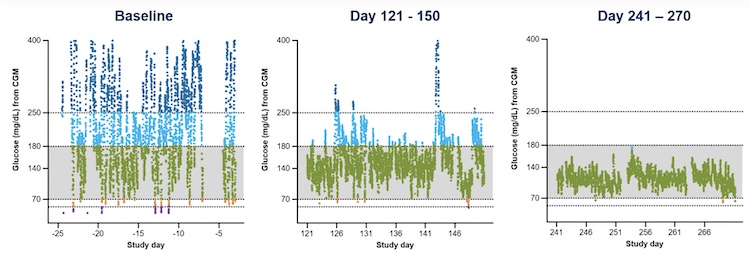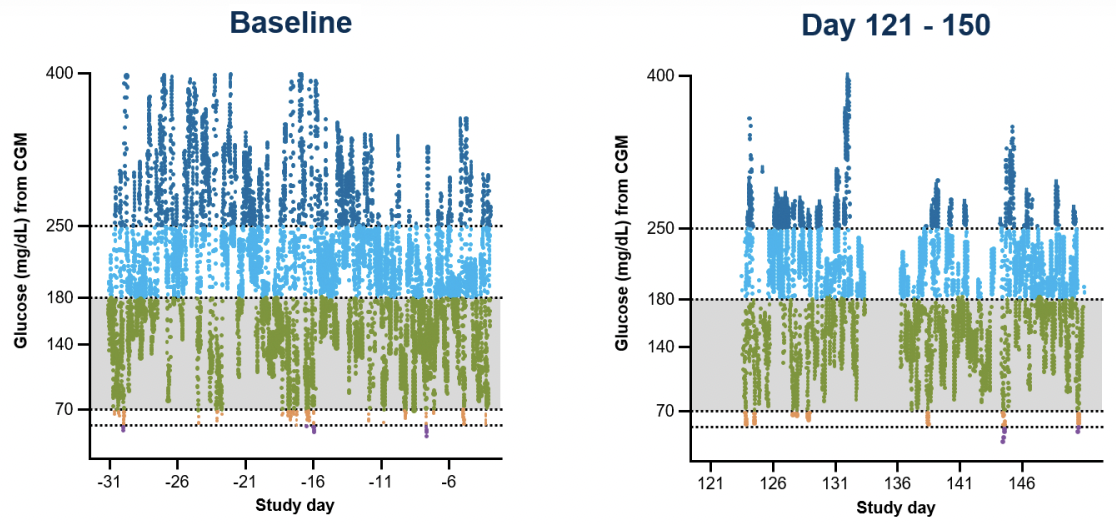Vertex Releases New Data on Potential Cure for Type 1 Diabetes

Key takeaways:
- VX-880 is an investigational stem cell therapy by Vertex that shows promise as a functional “cure” for type 1 diabetes.
- New data shows that study participants experienced significant improvements in A1C, glucose control, and a reduced need for insulin.
- The VX-880 trial was put on hold earlier in 2024 due to two participant deaths. The deaths are now believed to be unrelated to the study drug.
Vertex presented new data this week at the ADA 2024 in Orlando, Florida, on its closely watched clinical trial VX-880, which has been hailed as a potentially revolutionary treatment for people with type 1 diabetes. The trial, which was paused earlier this year following the deaths of two participants, has now resumed and is actively recruiting.
Though the study is still in early phases, results have been promising. All 12 participants who received a full dose of VX-880 saw a reduction in A1C of less than 7% and no longer experienced severe hypoglycemic events. Eleven of the 12 participants had either a reduced need or complete elimination of exogenous insulin (meaning injectable insulin not naturally produced by the body). In addition, all participants experienced significant improvements in A1C, time in range, as well as a reduced need for insulin injections.
“All 12 patients demonstrated clinically meaningful insulin production and improved glucose control by day 90,” said Dr. Piotr Witkowski, director of the pancreatic and islet transplant program at UChicago Medicine and member of the Vertex VX-880 steering committee.
“You can also see an improved percentage of time in range, and reduction of time below and above range,” he added.
Of the three patients who passed the one-year mark following treatment, all achieved and maintained insulin independence. This indicates that VX-880 could be a much-awaited functional “cure” for type 1 diabetes.
Before treatment with VX-880, all study participants produced zero insulin and had a history of severe, recurring episodes of hypoglycemia (low blood sugar). Three months after cell transplantation, participants exhibited insulin production that successfully responded to glucose.
Participant deaths: what happened?
Despite positive results in the early stages of the VX-880 trial, Vertex halted the study in January 2024 after two participants died.
During a presentation at the annual American Diabetes Association (ADA) conference in June, Witkowski revealed that both deaths were unrelated to VX-880 treatment. One participant, he said, died of meningitis developed following sinus surgery not related to the study. The other participant died from a traumatic brain injury following a motorcycle accident caused by a severe episode of hypoglycemia.
One participant remains unknown but the other, Brian Shelton, 66, was said to be the first person “cured” of type 1 diabetes with VX-880. Shelton successfully started producing his own insulin in 2021 six months after the investigational treatment.
Though the trial is back on track, it’s unclear if the three-month pause will affect Vertex’s timeline for completing the clinical trial.
What is VX-880 therapy?
A type of experimental stem cell therapy, VX-880 aims to restore natural insulin production in people with type 1 diabetes. This would result in a drastic improvement in quality of life as those with the disease would no longer require insulin or experience severe, sometimes life-threatening, episodes of hypoglycemia.
Stem cell therapies like VX-880 work by transplanting healthy insulin-producing cells into the body. If successful, the new cells would replace non-functioning ones and ultimately restore insulin production.
Similar to people who receive organ transplants, those treated with VX-880 must take immunosuppressants to prevent the immune system from rejecting new beta cells.
Because of the risk of infection associated with immunosuppressants, only those with severe hypoglycemia unawareness have been eligible for Vertex’s trial. This is because these candidates have the most to gain from this type of therapy, given the risks associated with hypoglycemia unawareness.
The history behind VX-880
Vertex first announced the development of VX-880 in 2021. Data from the first two participants in the trial were presented by Dr. James Markmann, chief of the division of transplant surgery at Massachusetts General Hospital, at the 2022 ADA conference.
In the first phase of the trial, each participant was given half the dose of beta cells estimated to be required. A common practice in these types of studies is starting with half the expected dose and increasing it as the trial progresses.
The following results show astonishing improvements in A1C, time in range, and reduced insulin needs for each participant. For reference, the ADA Standards of Care recommends a target time in range of 70% (70-180 mg/dL). There is no “standard” insulin dose, as daily insulin doses are determined by a healthcare provider based on the needs of each individual. To put this in perspective, here’s a closer look at some of the data from two participants.
Participant 1
| Study day | Day 0 (baseline) | Day 121-150 | Day 241-270 |
| Daily Insulin dose | 34 units | 2.6 units | 0 units |
| Time in Range | 40.1% | 81.4% | 99.9% |
| A1C | 8.6% | 6.7% | 5.2% |

Participant 2
| Study day | Day 0 (baseline) | Day 121-150 |
| Daily Insulin dose | 25.9 units | 18.2 units |
| Time in Range | 35.9% | 51.9% |
| A1C | 7.5% | 7.1% |

The future of VX-880
While there was initial concern about the two participant deaths being related to the VX-880 procedure, Witkowski said that “no severe adverse events were related to the islet cells themselves.”
So far, the safety profile of VX-880 is similar to what would be expected given the use of immunosuppressants, the surgical procedure to implant the cells, and the participants’ medical history.
Following the recent positive results presented at ADA 2024, the study is not only ongoing but is recruiting more participants. Right now, there are 14 participants in the VX-880 trial and Witkowski said they’re looking to up the number to 37 (see here for details on how to enroll).
The data also shows promise for VX-264, another new Vertex stem cell treatment that does not require immunosuppression currently being investigated in clinical trials.
When will this become available to more people with type 1 diabetes?
Unlike other interventions, such as pancreas transplants or beta cell islet transplants from human donors, VX-880 has the potential to be used on a much larger scale.
“Right now in the U.S., there are only about 1,000 pancreas transplants available, so supply is a significant problem,” Markmann said. “One of the most important aspects of this work is that there can be an unlimited supply of beta cells for transplantation going forward.”
While the results so far are exciting, research is still in the early stages. The current trial is anticipated to wrap up in 2030, and additional studies with larger sample sizes would need to follow. After all of the studies are completed, Vertex needs to submit an application to the FDA before it can be approved for use.
“This is groundbreaking work and a real leap forward for the field,” said Markmann. “While we cannot say exactly when this will become available, we are much closer to a functional cure for type 1 diabetes than we were before this approach.”
Learn more about treatments and the search for a type 1 diabetes cure here: